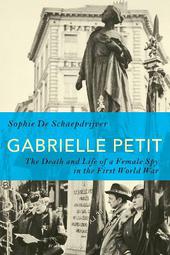
|
Gabrielle Petit: The Death and Life of a Female Spy in the First World War
Hardback
Main Details
| Title |
Gabrielle Petit: The Death and Life of a Female Spy in the First World War
|
| Authors and Contributors |
By (author) Sophie De Schaepdrijver
|
| Physical Properties |
| Format:Hardback | | Pages:272 | | Dimensions(mm): Height 234,Width 156 |
|
| Category/Genre | First world war |
|---|
| ISBN/Barcode |
9781472590879
|
| Classifications | Dewey:940.48641092 |
|---|
| Audience | |
|---|
| Illustrations |
2 Maps
|
|
Publishing Details |
| Publisher |
Bloomsbury Publishing PLC
|
| Imprint |
Bloomsbury Academic
|
| Publication Date |
29 January 2015 |
| Publication Country |
United Kingdom
|
Description
In central Brussels stands a statue of a young woman. Built in 1923, it is the first monument to a working-class woman in European history. Her name was Gabrielle Petit. History has forgotten Petit, an ambitious and patriotic Belgian, executed by firing squad in 1916 for her role as an intelligence agent for the British Army. After the First World War she was celebrated as an example of stern endeavour, but a hundred years later her memory has faded. In the first part of this historical biography Sophie De Schaepdrijver uses Petit's life to explore gender, class and heroism in the context of occupied Europe. Petit's experiences reveal the reality of civilian engagement under military occupation and the emergence of modern espionage. The second part of the book focuses on the legacy and cultural memory of Petit and the First World War. By analysing Petit's representation in ceremony, discourse and popular culture De Schaepdrijver expands our understanding of remembrance across the 20th century.
Author Biography
Sophie De Schaepdrijver is Associate Professor of History at Penn State University, USA. She is an award-winning historian of the social and cultural history of the First World War.
ReviewsAccessible and rewarding ... De Schaepdrijver helps to restore Petit's memory while asking fascinating questions about why we should remember and how such commemoration serves us. * History Today * De Schaepdrijver's book is a model of how the cultural history of the war should be written. * Times Higher Education * Minutely researched. -- Caroline Moorhead * Times Literary Supplement * A Book of the Year 2015 * The Spectator * De Schaepdrijver meticulously pieces together the fragments [of Petit's life and death] that she has gathered from contemporary and inter-war documents ... A richly detailed account which will especially appeal to social historians of the First World War and those interested in memorialisation. * Women's History Review * De Schaepdrijver has painstakingly reconstructed Petit's short life from fragments tucked away in Belgian, German, and British archives ... [She] tells Petit's interconnected stories with clarity and verve ... [A] fascinating book. * American Historical Review * The result of detailed research in a variety of archives ... Schaepdrijver's book is a welcome corrective to such neglect [as Petit has received.] * Journal of European Studies * De Schaepdrijver's research is meticulous; her prose is elegant, engaging, and often poignant ... A triumph of scholarship, even in the book's most biographical moments the reader consistently has a strong sense of the many national and international currents uniquely illuminated by this one remarkable life and its afterglow. * European History Quarterly * An excellent study of the life and afterlife of a young woman turned spy turned martyr turned icon of sacrifice. It is a fine and powerful addition to the growing literature on the cultural history of the Great War. * Jay Winter, Charles J. Stille Professor of History, Yale University, USA * An unusual story, beautifully told, of a young woman who spied for the Allies behind the Western Front, was captured by the Germans, and executed. Unlike the death of nurse Edith Cavell, whose execution caused a worldwide uproar, Gabrielle Petit's fate went almost unnoticed at first. Only after the armistice would her contemporaries, to whom she was a modern Joan of Arc, raise her to the status of national heroine. With all the skill of a Natalie Zemon Davis, Sophie De Schaepdrijver brings to life a figure who fought the first German occupation of Europe in the twentieth century. This is at once the biography of a woman and her achievement of autonomy, and a riveting account of dangerous intelligence work, hitherto previously unknown. The sophisticated world of German counter-intelligence that rolled up the Allied espionage networks is equally well treated. Furthermore, the book analyses the construction of memory, that vital ingredient of our culture. Using biography to unlock the multiple histories of the war, it is nothing short of a triumph of modern historiography. A must-read for all those interested in the First World War. * Alan Kramer, Professor of European History, Trinity College Dublin, Ireland *
|